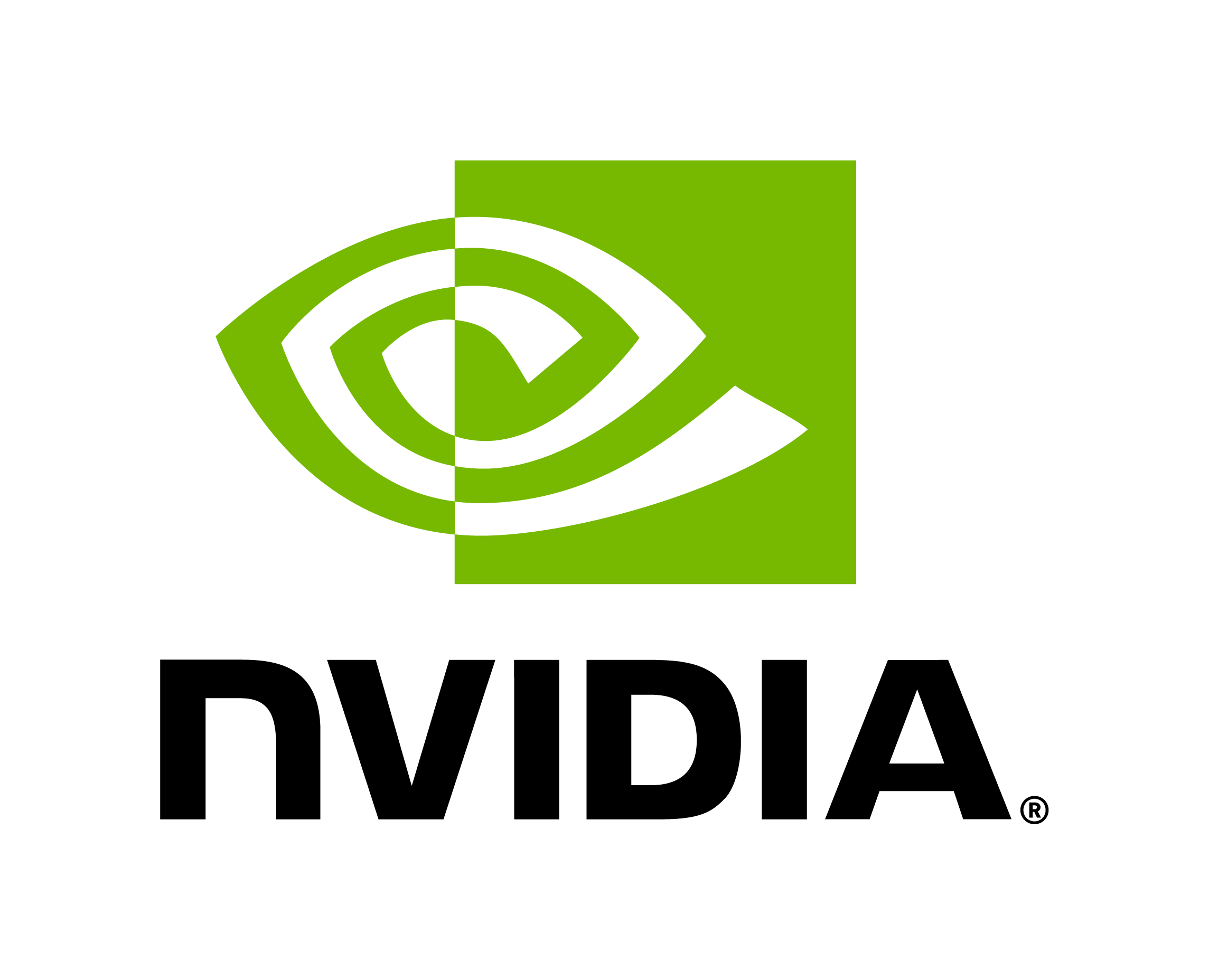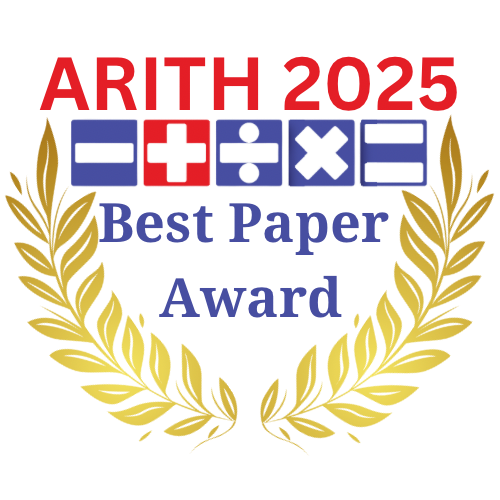Slides Email: slides@arith2025.org
Please submit your slides to this email address in PDF format.
ARITH 2025 Keynotes
Arithmetic questions in Fully Homomorphic Encryption
Anamaria Costache1
 |
1 is an associate professor at the Norwegian University of Science and Technology. |
Fully Homomorphic Encryption (FHE) is a type of encryption that allows to compute on encrypted data. First proposed as a concept in 1978, the construction of such a primitive remained an open problem for nearly three decades, until Gentry proposed the first construction in 2009. Since then, many improvements have appeared and we are now beginning to see the first deployments of FHE in the industry.
This talk aims to present the most important arithmetic questions in FHE. We will begin by giving a general introduction to FHE and motivate its use. Then, we will dive into a more technical presentation, showing how to construct an FHE scheme. The aim of the talk is to give an overview of the arithmetic structures considered in FHE, both in terms of data types supported, as well as to highlight some optimisation algorithms that can be interesting to the ARITH community, such as the use of the Residue Number System (RNS) in FHE to accelerate computations. Ultimately, we hope to present and highlight areas of research that are of interest to both the cryptographic and ARITH communities.
Application-Specific Arithmetic
Florent de Dinechin2 and Martin Kumm3
 |
 |
2 is a professor at INSA-Lyon, where he teaches computer architecture and compilers. His main research interests are computer arithmetic, FPGAs, and elementary functions. |
3 is a professor at Fulda University of Applied Sciences. His research interest is computer arithmetic and its optimization with particular emphasis on FPGAs. |
Together, they manage the FloPoCo project and co-authored the 2024 book "Application-Specific Arithmetic: Computing Just Right for the Reconfigurable Computer and the Dark Silicon Era". |
|
Mainstream microprocessors have to be universal and versatile, and this is reflected in the arithmetic operations they support in hardware. However they are increasingly being complemented by hardware accelerators customized to very specific algorithms. In those accelerators, the arithmetic operators do not need to be versatile nor universal, they need to do one thing for one application, and do it well (according to the metrics of the application).
This talk will survey the challenges and opportunities of designing such application-specific arithmetic hardware. Any precision may be useful, any number encoding, but also any operation or function, provided an efficient circuit can be designed for it. To address this overwhelming freedom, we will review some of the key methodologies and tools that allow a designer to build and compose application-specific operators.
Symposium at a glance
Time (UTC-6) |
Monday May 5th, 2025 |
Tuesday May 6th, 2025 |
Wednesday May 7th, 2025 |
|---|---|---|---|
| 9:00 to 9:30 | Welcome Location: EPNGCC |
Session 4: Arithmetic Operations (Chair: Valentina Popescu) Location: EPNGCC
|
Session 6: Floating-Point and Error Analysis (Chair: Pavel Panchekha) Location: EPNGCC
|
| 9:30 to 11:00 |
Session 1: AI and Arithmetic (Chair: Frédéric Pétrot) Location: EPNGCC
|
||
| 11:00 to 11:30 | Break | ||
| 11:30 to 12:30 | 1st Keynote Talk: Arithmetic questions in Fully Homomorphic Encryption by Anamaria Costache Location: EPNGCC |
2nd Keynote Talk: Application-Specific Arithmetic by Florent de Dinechin and Martin Kumm Location: EPNGCC |
Session 7: Verification (Chair: Guillaume Melquiond) Location: EPNGCC
|
| 12:30 to 2:00 | Lunch Location: EPNGCC |
||
| 2:00 to 3:30 |
Session 2: Hardware Operators (Chair: Alexandre Tenca) Location: EPNGCC
|
Steering Committee meeting Location: CCSB 3.0908 (2:00-3:00) |
Social Event
White Sands Trip |
| 3:30 to 4:00 | Break | ||
| 4:00 to 5:30 |
Session 3: Scientific Computing and Arithmetic (Chair: Peter Tang) Location: EPNGCC
|
Session 5: Numerical Tools and Software (Chair: Christoph Lauter) Location: EPNGCC
|
|
| 5:30 to 6:30 | Panel: Correctly Rounded Functions |
Banquet Location: IDRB Lobby |
|
Detailed Program - Subject to Change
All times are displayed in Mountain Daylight Time (UTC-6)
Sunday May 4th, 2025 |
|
|---|---|
| 5:00 pm to 7:00 pm | Welcome Reception & Registration Location: CCSB Patio Join us for a cocktail reception. Badges will be available for pickup. Please note that no scientific sessions will be held on Sunday May 4th. On-cite registration will be available. |
Monday May 5th, 2025 |
|
| 9:00 to 9:30 | Welcome |
| 9:30 to 11:00 |
Session 1: AI and Arithmetic (Chair: Frédéric Pétrot) Location: EPNGCC
|
| 11:00 to 11:30 | Break |
| 11:30 to 12:30 |  1st Keynote Talk 1st Keynote TalkLocation: EPNGCC Arithmetic questions in Fully Homomorphic Encryption by Anamaria Costache |
| 12:30 to 2:00 | Lunch Location: EPNGCC |
| 2:00 to 3:30 |
Session 2: Hardware Operators (Chair: Alexandre Tenca) Location: EPNGCC
|
| 3:30 to 4:00 | Break |
| 4:00 to 5:30 |
Session 3: Scientific Computing and Arithmetic (Chair: Peter Tang) Location: EPNGCC |
| 5:30 to 6:30 | 
 Panel: Correctly Rounded Functions
Panel: Correctly Rounded FunctionsLocation: EPNGCC |
Tuesday May 6th, 2025 |
|
| 9:00 to 11:00 |
Session 4: Arithmetic Operations (Chair: Valentina Popescu) Location: EPNGCC
|
| 11:00 to 11:30 | Break |
| 11:30 to 12:30 |  2nd Keynote Talk 2nd Keynote Talk Location: EPNGCC Application-Specific Arithmetic by Florent de Dinechin and Martin Kumm |
| 12:30 to 2:00 | Lunch Location: EPNGCC |
| 2:00 to 3:00 | Steering Committee meeting Location: CCSB 3.0908 |
| 3:00 to 4:00 | Break |
| 4:00 to 5:30 |
Session 5: Numerical Tools and Software (Chair: Christoph Lauter) Location: EPNGCC
|
| 5:30 | Banquet Location: IDRB Lobby |
Wednesday May 7th, 2025 |
|
| 9:00 to 11:00 |
Session 6: Floating-Point and Error Analysis (Chair: Pavel Panchekha) Location: EPNGCC
|
| 11:00 to 11:30 | Break |
| 11:30 to 12:30 |
Session 7: Verification (Chair: Guillaume Melquiond) Location: EPNGCC |
| 12:30 to 2:00 | Lunch Location: EPNGCC |
| 2:00 to 6:00 | Social Event |








